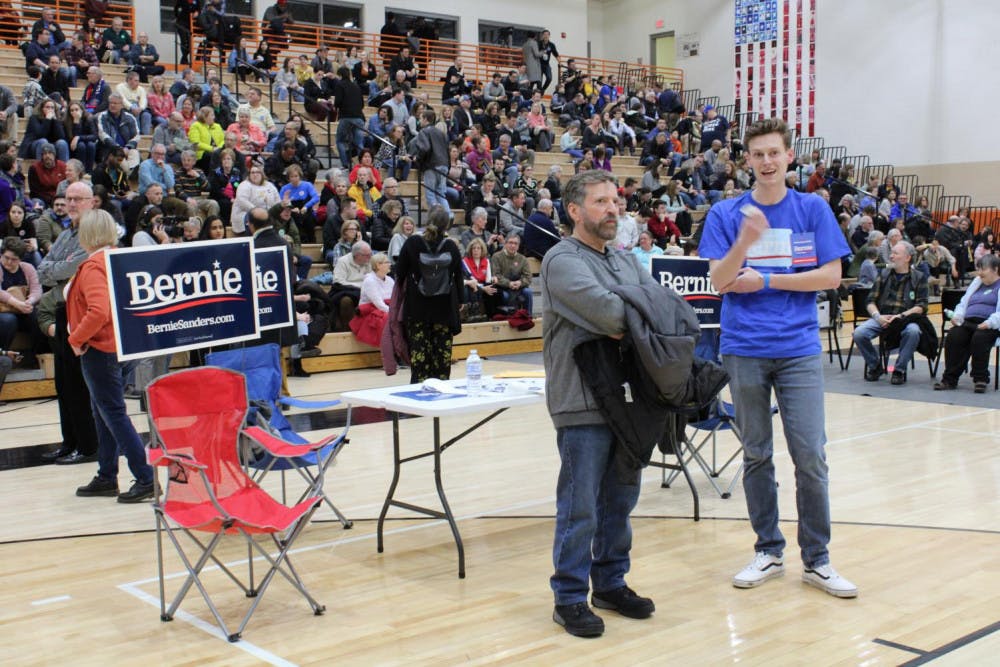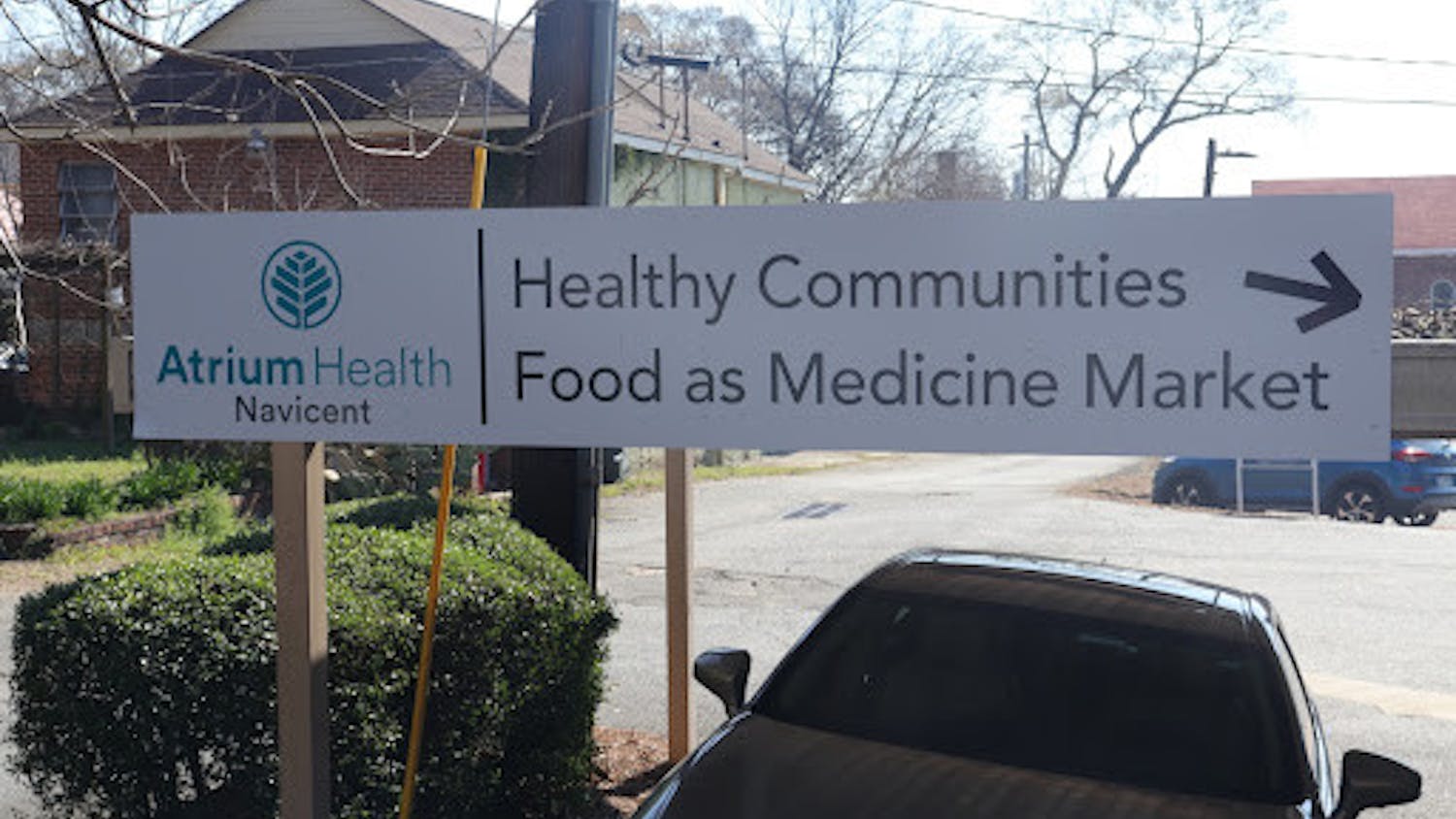Mary Helene Hall traveled to Iowa with Mercer's special topics course on presidential primaries, communications and the media. She attended the Democratic caucuses Feb. 3.
It’s the evening of February 3 at Polk County, Iowa’s 311th and 312th precincts. About 800 people are in attendance, most wearing stickers supporting their chosen candidates. The scene does not resemble that of a primary election polling place. In fact, it is almost the opposite.
The caucusgoers are being counted, and eventually, a winner will be announced.
But let’s back up a minute. What exactly is a caucus, and what makes it so different from a primary?
“In a caucus, geographic areas called precincts are identified, which include you and your neighbors within a certain area,” said Jennifer Wadsworth, an Iowa resident and turf captain at a campaign office in West Des Moines for Pete Buttigieg.
“All of you get together and as a group, cast your ballot for a candidate, but it's not as much a voting process as it is is a social influence process. So you're seeing in the room how all of your neighbors are voting, and you have the opportunity to influence the neighbors around you in their vote.”
When it comes to voting for a presidential nominee, different states have different ways of doing things. Ten states—including Iowa—choose to caucus instead of vote in a primary.
Before the caucus begins, candidate volunteers have three minutes each to give speeches they hope will sway the undecided.
Caucuses allow for a unique kind of collaboration. In the first of the two phases of a caucus, called alignments, people physically gather at a designated area for the candidate they support.
Everyone is tallied up, and if a candidate has less than 15 percent of total attendance in their area, they are considered unviable and cannot move on. In the second alignment, people supporting unviable candidates are given the opportunity to switch to a viable candidate.
After that, candidates receive delegates based on how many supporters they have in the precinct.
Because Iowa is the first state in the Presidential primary season, candidates typically focus their full attention on the state for as long as a year.
Claire Dupis is a student at Iowa State University. She’s lived in Ames, Iowa, her entire life. She says she enjoys the opportunity to be exposed to all of the candidates.
“I've always really liked it because it really gives us a chance to be exposed to these politicians because they are coming through Ames pretty frequently,” Dupis said. “So you have, you know, an opportunity to see these people up close and personal.”
The caucus also helps the state financially. For instance, many people travel from out of town to see candidates speak.
“It provides quite the economic boost with all of the people who are coming in from out of town,” said Wadsworth. “People who are going to different towns to watch speakers. There's a lot of money that comes in."
Even with their advantages, caucuses aren’t the best for all voters.
While voters who are unable to attend a primary can vote absentee weeks in advance, potential caucusgoers don’t exactly have that option. Jack Siemieniec, a retired Iowan, said that he wasn’t sure if he’d be able to caucus or not.
“I still haven't found out if I'm working on Monday evening or not,” said Siemieniec. “That's one kind of unfortunate thing about the caucus system is that if you have a primary people can vote all throughout the day. If you have the caucus, you have to be there that evening.”
This puts working voters or those without reliable transportation or child care in a difficult position. It means that some registered voters may not even get the chance to caucus in the first place.
Hosting a caucus can also be tiring for some citizens. Wadsworth says that it can be a bit draining sometimes.
“As I appreciate the seriousness of this event, I'm ready for the attention to move on to another state,” said Wadsworth. “One gets tired of the political ads and the political talk and everybody who just wants to go back to their normal lives. But we also recognize how important this is.”
Since 1972, the winner of the Iowa caucus has gone on to be the nominee for the party about 56 percent of the time, according to USA Today. So, it’s not certain that the caucus winner will win the nomination, but it does provide a boost in momentum.
Now that we know what a caucus is, let’s head back to the precinct.
We’re in a high school gymnasium, and the energy is high. People are standing in lines around their desired candidates’ sections. They’re being tallied up for the second alignment.
Pete Buttigieg received the most support in both precincts. If things go like they are supposed to, results will be in by the end of the night, and candidates will move on to New Hampshire knowing where they stand.
Except, that’s not quite what happened.
The final numbers of each precinct were supposed to be reported through a secure app, but many people reported issues downloading and accessing it. There was also a hotline that results could be reported through, but it got backed up due to the problems with the app.
Some issues also arose with numbers being reported correctly due to the coding of the app.
The full results should have been published after caucusing was complete. Instead, Associated Press called for all previously published results to be erased while the Iowa Democratic Party figured out what was going on.
Three days later, AP announced that no winner could be declared despite the fact that 100% of precincts were reporting. The margin between Buttigieg and Senator Bernie Sanders was too close to call.
Buttigieg won the delegate equivalent by less than one-hundredth of a percent, but Sanders won the popular vote. Many news organizations, including CNN, reported that Buttigieg won the caucus.
So far, both Buttigieg and Sanders have called for a partial recount.
All of the candidates have moved on to the other early primary states. It remains unseen when the total, definitive results of the caucus will be released. Until then, all we can do is sit back, wait for the results across the country to come in and hope there are no more polling errors.
Mary Helene Hall ‘23 is a journalism and women’s and gender studies student who has worked for The Cluster throughout her time at Mercer. She has held internships at The Atlanta Journal-Constitution and AL.com, where she covered a variety of topics including politics, crime and culture.





